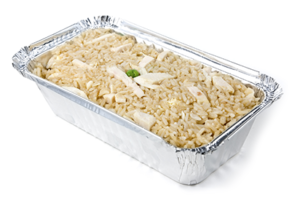Don’t leave your cooked rice on the benchtop overnight – food safety experts warn
Media release: 8 November 2014
Australian Food Safety Week 9-16 November 2014 Avoid the Temperature Danger Zone
According to a national Newspoll survey, commissioned for Australian Food Safety Week, an alarming 22% of Australians think it is ok to leave cooked rice out of the refrigerator for up to 6 hours or overnight – or even that it doesn’t need refrigerating at all.
Dr Michael Eyles, Food Safety Information Council Chair, said that many consumers consider that cooked rice is a low risk for food poisoning and can safely be left on the benchtop if the fridge is too full.
‘This just isn’t true. Spores from the bacteria Bacillus cereus can survive the cooking process and once the rice begins to cool, they can grow and form a heat resistant toxin. This toxin is not destroyed by further reheating, with only very small amounts needed to make you sick.’ Dr Eyles said.
‘In contrast it was pleasing to see people surveyed were much more aware that raw egg mayonnaise and chicken dishes were a high risk for food poisoning as only 4% thought it ok to leave those products unrefrigerated for up to 6 hours or overnight. But even 4% of consumers taking this risky behaviour adds to the estimated 4.1 million cases of food poisoning in Australia each year.
‘The Temperature Danger Zone for food lies between 5°C and 60°C because in this zone bacteria in food can grow and toxins can accumulate to unsafe levels within a few hours. If you hold hot food before serving it should be kept at 60°C or greater. We should always refrigerate or freeze cooked food that isn’t going to be eaten straight away and keep perishable food refrigerated under 5°C,’ Dr Eyles concluded.
The Food Safety Information Council says you can avoid becoming one of the estimated 4.1 million cases of food poisoning in Australia each year by following these 7 simple tips to keep your food out of the Temperature Danger Zone:
- Plan ahead. Don’t over cater as the greater the quantity of food you prepare the harder it is to keep it hot or cool enough. If you are catering for a lot of people prepare food as closely as you can to the time you will serve it.
- Keep your fridge at or below 5°C. Use a fridge thermometer to check that the fridge temperature stays around 4 to 5°C. Also make sure you have enough room in the fridge because if the food is packed tightly the cold air cannot circulate.
- Check the storage instructions. Read the label on packaged food to see if it needs to be stored in the fridge or freezer, many unrefrigerated items may need to be refrigerated once opened.
- Keep hot food at or over 60°C. Hot food needs to be kept and served at 60°C or hotter. If you are keeping it warm for someone put it in the oven at 60°C (or at 100°C if that is as low as your oven will go).
- Divide food up to cool. Freshly cooked food, not for immediate consumption, should have the temperature reduced as quickly as possible. Divide into containers in small portions and put it into the fridge or freezer as soon as it stops steaming.
- Keep food on the move cool. If you are transporting perishable food around such as: refrigerated or frozen shopping, your (or your child’s) lunch or goodies for a BBQ or a picnic always use a cooler bag and add a frozen block or drink to keep things cool.
- If in doubt throw it out. If perishable food has been in the temperature danger zone for 2 to 4 hours consume it immediately. After 4 hours throw it out.
Media contact:
Lydia Buchtmann, Food Safety Information Council, 0407 626 688
For further information: www.foodsafety.asn.au and our e-news room
Australian Food Safety Week is the major activity of the Food Safety Information Council which aims to address the estimated 4.1 million cases of food borne illness in Australia each year. Food poisoning results, on average, in 31,920 hospitalisations, 86 deaths and 1 million visits to doctors each year.
The Food Safety Information Council is Australia’s leading disseminator of consumer-targeted food safety information. It is a non-profit entity supported by the Australian Department of Health and Ageing, state and territory health and food safety agencies, local government, and leading professional, industry and community organisations.

